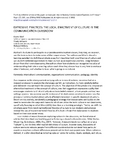- DSpace Home
- →
- Channel Islands
- →
- Academic Affairs
- →
- Faculty Scholarly and Creative Activities
- →
- Milburn, Trudy
JavaScript is disabled for your browser. Some features of this site may not work without it.
| dc.contributor.author | Wolf, Karen | en |
| dc.contributor.author | Wilkins, Richard | en |
| dc.contributor.author | Wolf, Karen | en |
| dc.contributor.author | Wilkins, Richard | en |
| dc.date.accessioned | 2009-07-22T20:06:49Z | en |
| dc.date.accessioned | 2009-07-22T20:06:49Z | en |
| dc.date.available | 2009-07-22T20:06:49Z | en |
| dc.date.available | 2009-07-22T20:06:49Z | en |
| dc.date.issued | 2008-06 | en |
| dc.date.issued | 2008-06 | en |
| dc.identifier.citation | Wolf, Karen; Milburn, Trudy; and Wilkins, Richard. "Expressive Practices: The Local Enactment of Culture in the Communication Classroom." Business Communication Quarterly. Volume 71. Number 2. June 2008. pp. 171-183. | en |
| dc.identifier.citation | Wolf, Karen; Milburn, Trudy; and Wilkins, Richard. "Expressive Practices: The Local Enactment of Culture in the Communication Classroom." Business Communication Quarterly. Volume 71. Number 2. June 2008. pp. 171-183. | en |
| dc.identifier.issn | 1552-4191 | en |
| dc.identifier.issn | 1552-4191 | en |
| dc.identifier.uri | http://hdl.handle.net/10139/653 | en |
| dc.identifier.uri | http://hdl.handle.net/10139/653 | en |
| dc.description.abstract | As students participate in corporate communication classes, they may, on occasion, use the term culture to make sense of their experiences. The authors use Mino's idea of a learning paradigm to shift the emphasis away from teaching traditional theories of culture and use student-centered experiences to teach culture as an expressive practice. Using instances drawn from their own classrooms, the authors show how students can recognize the value of understanding their role in creating culture each time they choose how to act, how to evaluate others' behavior, and whether to label what is going on as cultural | en |
| dc.description.abstract | As students participate in corporate communication classes, they may, on occasion, use the term culture to make sense of their experiences. The authors use Mino's idea of a learning paradigm to shift the emphasis away from teaching traditional theories of culture and use student-centered experiences to teach culture as an expressive practice. Using instances drawn from their own classrooms, the authors show how students can recognize the value of understanding their role in creating culture each time they choose how to act, how to evaluate others' behavior, and whether to label what is going on as cultural | en |
| dc.language.iso | en_US | en |
| dc.language.iso | en_US | en |
| dc.publisher | SAGE | en |
| dc.publisher | SAGE | en |
| dc.subject | intercultural communication | en |
| dc.subject | organizational communication | en |
| dc.subject | pedagogy | en |
| dc.subject | identity | en |
| dc.subject | intercultural communication | en |
| dc.subject | organizational communication | en |
| dc.subject | pedagogy | en |
| dc.subject | identity | en |
| dc.title | Expressive Practices: The Local Enactment of Culture in the Communication Classroom | en |
| dc.title | Expressive Practices: The Local Enactment of Culture in the Communication Classroom | en |
| dc.type | Postprint | en |
| dc.type | Postprint | en |
| dc.contributor.csuciauthor | Milburn, Trudy | en |
| dc.contributor.csuciauthor | Milburn, Trudy | en |
Files in this item
This item appears in the following Collection(s)
-
Milburn, Trudy [1]

